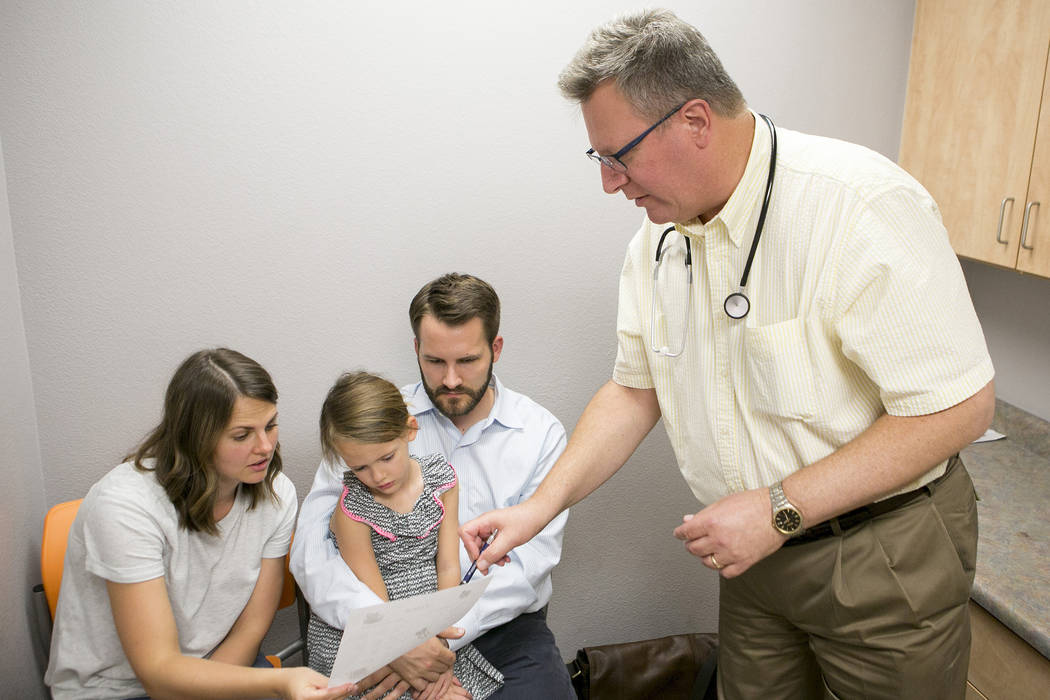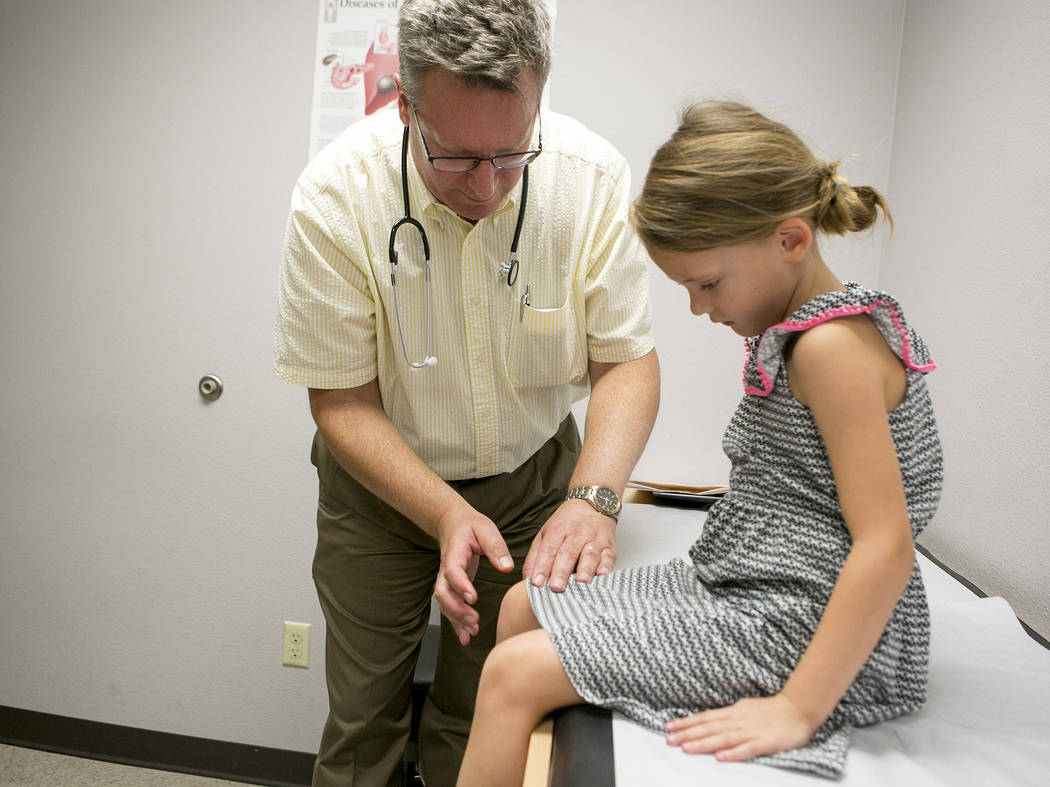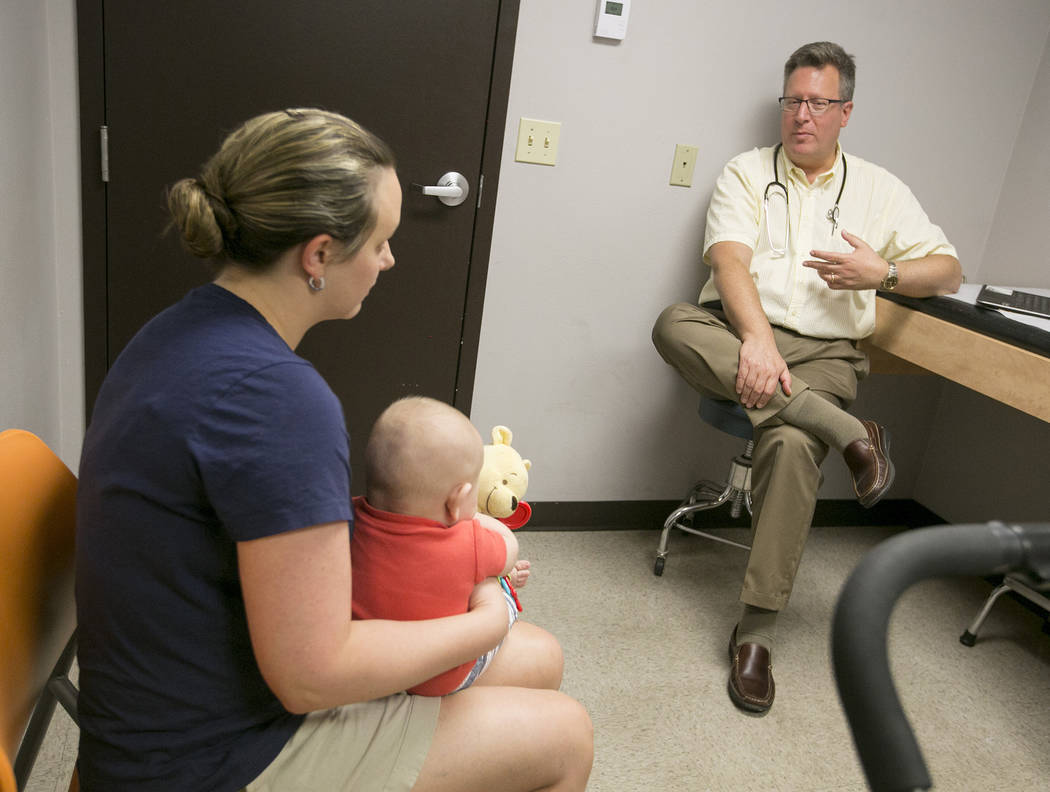Stroke of pen kept Nevada from setting health care precedent
The U.S. Senate’s draft of a new health care bill promises to cut funding toward Medicaid expansion and cap the program’s budget.
Meanwhile, Nevada this month was a signature away from creating a potentially precedent-setting law that would have opened Medicaid coverage to all state residents.
But Republican Gov. Brian Sandoval’s veto of Assembly Bill 374 — popularized as Sprinklecare as it gained national attention — may have prevented a massive failure, experts say.
The plan, which did not get any Republican support in the Legislature, would have added a Medicaid plan to the Nevada Silver State Insurance Exchange and allowed non-qualifying individuals to buy in at full cost, with competitive premiums and deductibles compared with private insurance.
Those rates were undetermined. But with a provider shortage in the state, particularly for Medicaid patients, experts weren’t convinced unrestricted access to Medicaid was the solution to slashing the uninsured rate.
The Nevada Care Plan, introduced in March by Assemblyman Mike Sprinkle, D-Sparks, would have required a waiver from the federal Center for Medicare and Medicaid Services to allow individuals of all income brackets to purchase the plan typically reserved for low-income Americans.
That was a major hurdle to clear, Sandoval said in his veto message.
“If more people shift (voluntarily or not) from commercial insurance to Medicaid-like insurance, that provider mix may prove unstable, resulting in fewer doctors seeing Medicaid patients, or fewer doctors altogether,” Sandoval wrote. “The net result could mean greater wait times and less provider availability for all Nevadans.”
The debate
“I think it would be a good safety-net option, particularly depending on what happens with federal legislation,” said Christopher Cochran, health care administration department chair at UNLV.
The plan would theoretically be cheaper than private competitors, but doctors say it would have burdened providers who accept Medicaid — and, as a result, would have lowered reimbursement rates.
“You have to be able to keep your lights on and open and pay your staff,” said Howard Baron, a pediatric gastroenterologist and secretary of the Nevada State Medical Association. “You’re no good to anyone if you can’t.”
Baron is among the approximately 79 percent of Nevada providers who accept new Medicaid patients, compared with about 84 percent of providers accepting new privately insured patients. Half of Baron’s patients are covered by the public plan.
He’s been able to run a profitable practice despite lower reimbursement rates, but “if 53 percent of our practice is Medicaid right now, and this (bill) converted it to 70 percent, we may have ultimately tipped the scales to say, ‘Well, gee, we can’t do this kind of work anymore with the reimbursement rates for Medicaid.’”
Provider problems
Jay Shen, health sciences associate dean at UNLV, said the bill may have helped cut the state’s 11 percent uninsured rate. Prior to the expansion of Medicaid in 2014, Nevada’s uninsured rate hovered around 20 percent.
But as Sandoval said, Sprinkle’s bill left many questions unanswered. It could have offered lower premiums, but it didn’t outline a plan to attract healthy patients, who generally cost the system less than their sick counterparts.
“But the question would be, who would be more likely to sign up for this program?” Shen asked.
Other doctors, Baron said, would probably have opted not to cover Medicaid patients if it meant struggling to run their businesses. So while the plan would likely have resulted in more affordable health insurance for residents, it may have made finding care more difficult.
Shen’s own research shows just that. While uninsured Nevadans, specifically Hispanic residents, became eligible for Medicaid with the expansion under the Affordable Care Act, those residents struggled to find an appointment at a Medicaid-accepting primary care practice, leaving them to choose between expensive emergency care or not seeking help at all.
Compared with the rest of the U.S., Nevada ranks among the worst in primary care availability.
“That’s a challenge for our state because providers are reluctant,” Shen said. “We are in a great shortage in our state, especially for Medicaid patients.”
A template?
Sandoval said in his veto that the concepts of Sprinkle’s bill could be used in the drafting of a future health care bill, but the bill that landed on his desk had too much uncertainty to make into law.
“I applaud the sponsor for his creativity, and I believe that the concepts in this bill may play a critical role in future healthcare policy,” Sandoval wrote in his veto. “However, AB 374 raises more questions than it answers, while adding more uncertainty to an industry that needs less.”
Sprinkle said in a statement he was disappointed with the governor’s decision.
“I will continue to believe that health care is a right and not a privilege and to make sure your government provides you with that right,” he said.
And the bill was a step toward increasing access to health coverage in the state, Cochran said, though the U.S. Senate’s draft health bill released Thursday could hinder attempts to increase coverage if it passes with provisions that would phase out Medicaid expansion funding.
“Nevada has kind of changed its tune since 2010, since the ACA was passed,” he said. “(The bill is) something that deserves scrutiny depending on what comes out of Washington.”
Contact Jessie Bekker at jbekker@reviewjournal.com or 702-380-4563. Follow @jessiebekks on Twitter.
How the Nevada Care Plan would have worked
AB 374 would have allowed people to buy a Medicaid-like plan for 100 percent of the cost. It would have competed against private plans on the exchange.
Residents qualifying for tax credits under the Affordable Care Act could use them to purchase a Medicaid plan. Otherwise, people could pay out of pocket.
The plan, unlike typical Medicaid, would not cover emergency medical transportation.
The bill did not outline the cost of premiums and co-payments under the Nevada Care Plan, as well as whether the plan would come with a deductible.




























